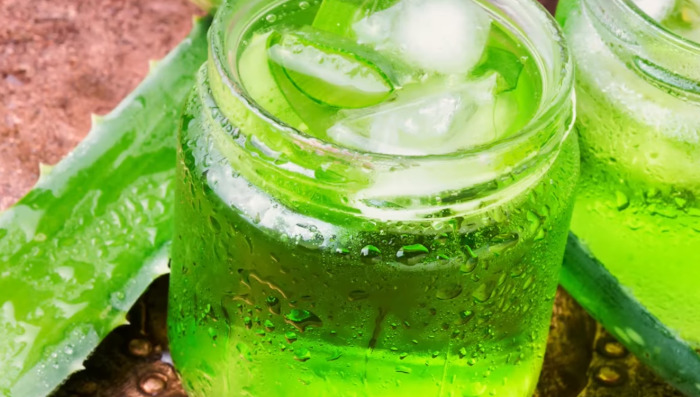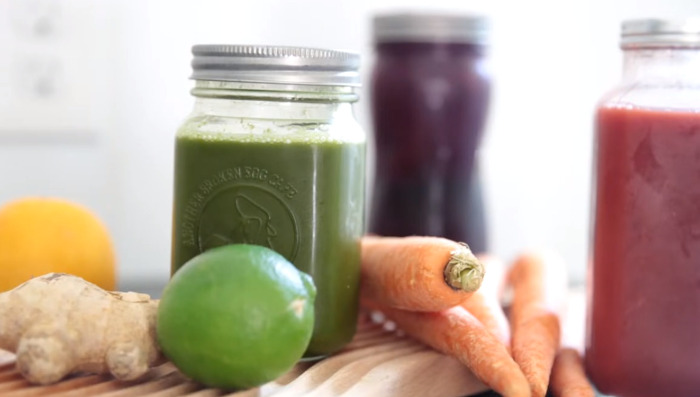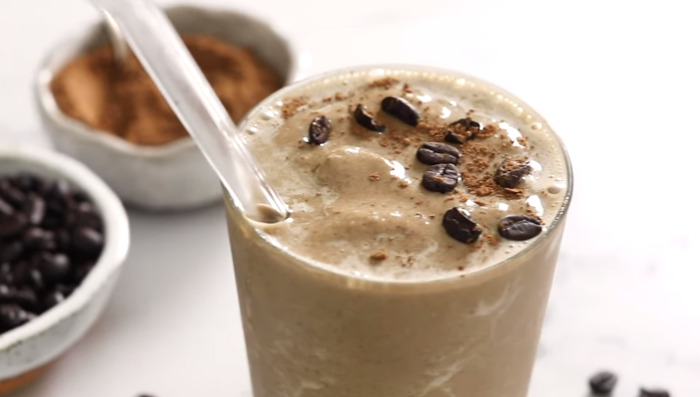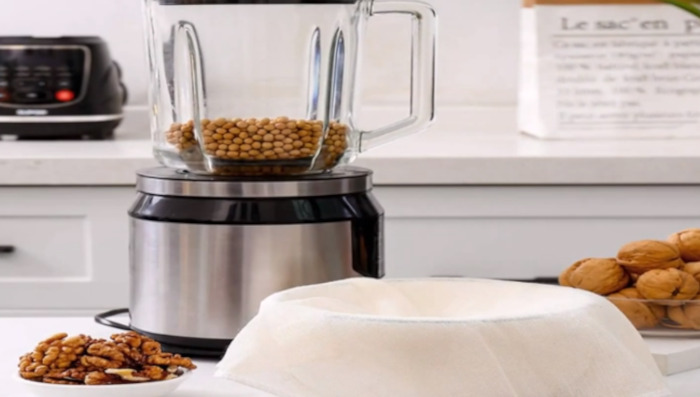What Is Aloe Vera Juice?
Aloe vera juice, derived from the inner gel of aloe vera plants. It is renowned for its versatile health benefits. Packed with a wealth of nutrients like antioxidants, vitamins, enzymes, and amino acids, this natural elixir boasts an impressive nutritional profile. Its anti-inflammatory properties make it a go-to for reducing inflammation and promoting skin health. It’s even said to aid in detoxification and support digestive concerns like constipation and IBS symptoms.
Crafting your own aloe vera juice is simple. Peel the outer skin to unveil the inner gel, then blend it with cold filtered water for a refreshing beverage. But when opting for store-bought versions, be cautious. Ensure it holds the International Aloe Science Council certification and inspect ingredients to avoid added sweeteners.
Moderation is key; consuming around eight ounces daily or adding it to smoothies can offer benefits without causing digestive issues. However, excessive intake can lead to unwanted side effects like diarrhea due to its anthraquinone content.
Recipe to make Aloe Vera Juice:
Ingredients:
Crafting your own aloe vera juice at home is a straightforward process that requires just a few key ingredients. Here’s what you’ll need:
- Aloe Vera Leaf: Begin with a large aloe leaf, preferably freshly harvested for optimal nutrients.

- Filtered Water: Around six cups of cool filtered water will be needed to blend with the aloe gel.
- Lemon or Lime Juice: Adding a splash of lemon or lime juice can enhance the flavor of your homemade aloe vera juice.
Equipment:
With these basic kitchen tools, you’ll be well-equipped to make fresh and wholesome aloe vera juice at home.
- Knife: A sharp knife is essential for safely cutting and peeling the aloe vera leaf.
- Cutting Board: A cutting board provides a stable surface for working with the aloe leaf.
- Blender: A blender is the key tool for combining the aloe gel with water to create the juice.
- Measuring Cups: Measuring cups ensure you add the right amount of water and other ingredients.
- Citrus Juicer: If you’re adding lemon or lime juice, a citrus juicer helps extract the juice efficiently.
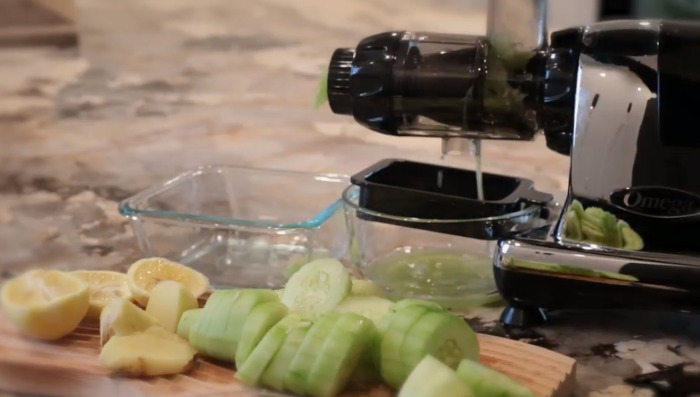
Instructions:
Follow these simple steps:
- Prepare the Aloe Leaf: Wash the aloe leaf thoroughly and let it sit in water. Alternatively, wash it by hand to remove any dirt.
- Peel the Leaf: Carefully peel the skin from both sides of the leaf until you expose the slimy inner gel.
- Cut into Cubes: Once the green peel is removed, cut the inner gel into cubes.

- Blend with Water: Place about six gel cubes into a blender, along with around six cups of cold, filtered water.
- Blend Well: Blend the mixture until the gel and water are fully combined.
- Add Flavor: For an extra kick, squeeze in some lemon or lime juice to enhance the taste.
- Enjoy Fresh: Your homemade aloe vera juice is now ready to enjoy. Pour it into a pitcher and store it in the refrigerator. You can also freeze aloe gel cubes to add to smoothies later.
Health benefits of Aloe Vera juice:
Aloe vera juice offers a host of health benefits, making it a popular choice for those seeking natural wellness. Here’s why incorporating aloe vera juice into your routine can be advantageous:
- Reduced Inflammation: Aloe vera’s anti-inflammatory properties help soothe inflammation in the body, aiding conditions like arthritis and digestive discomfort.
- Improved Skin Health: Aloe vera’s natural healing properties can enhance skin health, helping with wounds, burns, and even certain skin conditions.

- Detoxification Support: Aloe vera juice promotes detoxification by aiding the body’s natural cleansing processes, supporting liver health.
- Digestive Aid: Aloe vera can ease digestive concerns like constipation and even symptoms of irritable bowel syndrome (IBS).
- Dental Health: The antimicrobial properties of aloe vera benefit oral health, contributing to healthier gums and fresher breath.
Risk Factors of Aloe Vera Juice:
While aloe vera juice offers numerous benefits, it’s important to be aware of potential risks associated with its consumption. Here are some key risk factors to consider:
- Digestive Distress: Consuming excessive amounts of aloe vera juice can lead to digestive issues such as diarrhea and cramping due to its laxative properties.

Related Read: Juice For Bloating: Recipes And Benefits!
- Medication Interaction: Aloe vera juice may interact with medications metabolized by specific enzymes, potentially affecting their efficacy or causing adverse effects.
- Allergic Reactions: Some individuals may be allergic to aloe vera, experiencing skin irritation or other allergic reactions upon consumption.
- Kidney Health: Large doses of aloe vera juice could potentially harm kidney function, particularly in individuals with pre-existing kidney conditions.
Nutrition per serving:
Here’s a breakdown of the key nutrients you can expect in a typical serving of homemade aloe vera juice:
- Calories: A cup of plain aloe vera juice contains approximately 40 calories.
- Vitamins: Aloe vera juice provides essential vitamins such as vitamin C and vitamin E, which contribute to immune support and skin health.
- Minerals: Aloe vera juice contains minerals like magnesium, potassium, and calcium, essential for maintaining proper bodily functions.
- Enzymes: Natural enzymes found in aloe vera juice can aid digestion and promote gut health.
- Amino Acids: Aloe vera juice contains amino acids, the building blocks of proteins that support various bodily processes.
- Antioxidants: Rich in antioxidants, aloe vera juice helps combat oxidative stress and inflammation.
- Natural Sugars: Aloe vera juice contains natural sugars that provide a mild sweetness without the need for added sugars.
Tips for consuming Aloe Vera juice:
Incorporating aloe vera juice into your routine can offer numerous health benefits. Here are some practical tips to make the most of this natural elixir:
- Start Slow: Introduce aloe vera juice gradually to allow your body to adjust to its unique properties.
- Moderation is Key: Consume about eight ounces per day or add it to your smoothies for a balanced intake.
- Read Labels: Opt for certified aloe vera juice products with minimal added sugars and no artificial sweeteners.
- DIY Delight: Make your own aloe vera juice by blending the inner gel with cold, filtered water and a squeeze of lemon or lime for flavor.
- Pair with Food: Enjoy aloe vera juice alongside meals to support digestion and nutrient absorption.
- Listen to Your Body: If you experience any digestive discomfort, reduce your intake and observe how your body responds.
- Stay Hydrated: Aloe vera juice can be a refreshing addition to your hydration routine.
Wrapping up:
In the realm of natural health remedies, aloe vera juice stands out as a versatile elixir with a host of potential benefits. Extracted from the succulent leaves of the aloe plant, this juice offers a plethora of nutrients, antioxidants, and bioactive compounds. From soothing skin irritations to supporting digestion, aloe vera juice has found its way into wellness routines worldwide.
Remember, when incorporating aloe vera juice into your regimen, quality and moderation are key. Opt for certified products to ensure you’re getting the genuine benefits of this remarkable plant. Whether you’re sipping it straight or blending it into smoothies, aloe vera juice can complement your health journey. Embrace the potential of aloe vera juice as a natural companion on your path to wellness. By making informed choices and listening to your body, you can harness its potential for a healthier, more vibrant life.
FAQs:
Who should not drink aloe vera juice?
While aloe vera juice offers a range of potential benefits, it’s important to note that it may not be suitable for everyone. Pregnant individuals should exercise caution, as aloe’s compounds can stimulate uterine contractions, possibly increasing the risk of premature labor or miscarriage. Breastfeeding mothers should also avoid it, as the aloin content could lead to infant diarrhea.
Individuals with known kidney conditions should steer clear, as consuming large amounts of aloe juice might be harmful to kidney function. Moreover, aloe vera may interact with certain medications, particularly heart and diabetes medications.
Does aloe vera juice cause cancer?
There’s a common misconception that aloe vera juice can cause cancer, but this claim lacks scientific evidence. In fact, aloe vera is renowned for its potential health benefits, including its anti-inflammatory and antioxidant properties. Some studies suggest that aloe vera compounds may even have anticancer effects, but these findings are preliminary and more research is needed.
It’s important to base health decisions on accurate information. Aloe vera juice, when consumed in moderation and as part of a balanced diet, is generally considered safe.
Can you drink aloe vera juice every day?
Yes, you can include aloe vera juice in your daily routine, but moderation is key. Aloe vera offers potential health benefits due to its vitamins, minerals, and antioxidants. However, consuming it excessively can lead to digestive discomfort and other adverse effects. To make the most of its benefits, start with a small amount and gradually increase as your body adjusts. Remember, a balanced diet and consulting a healthcare professional are vital for making informed decisions about integrating aloe vera juice into your daily regimen.

